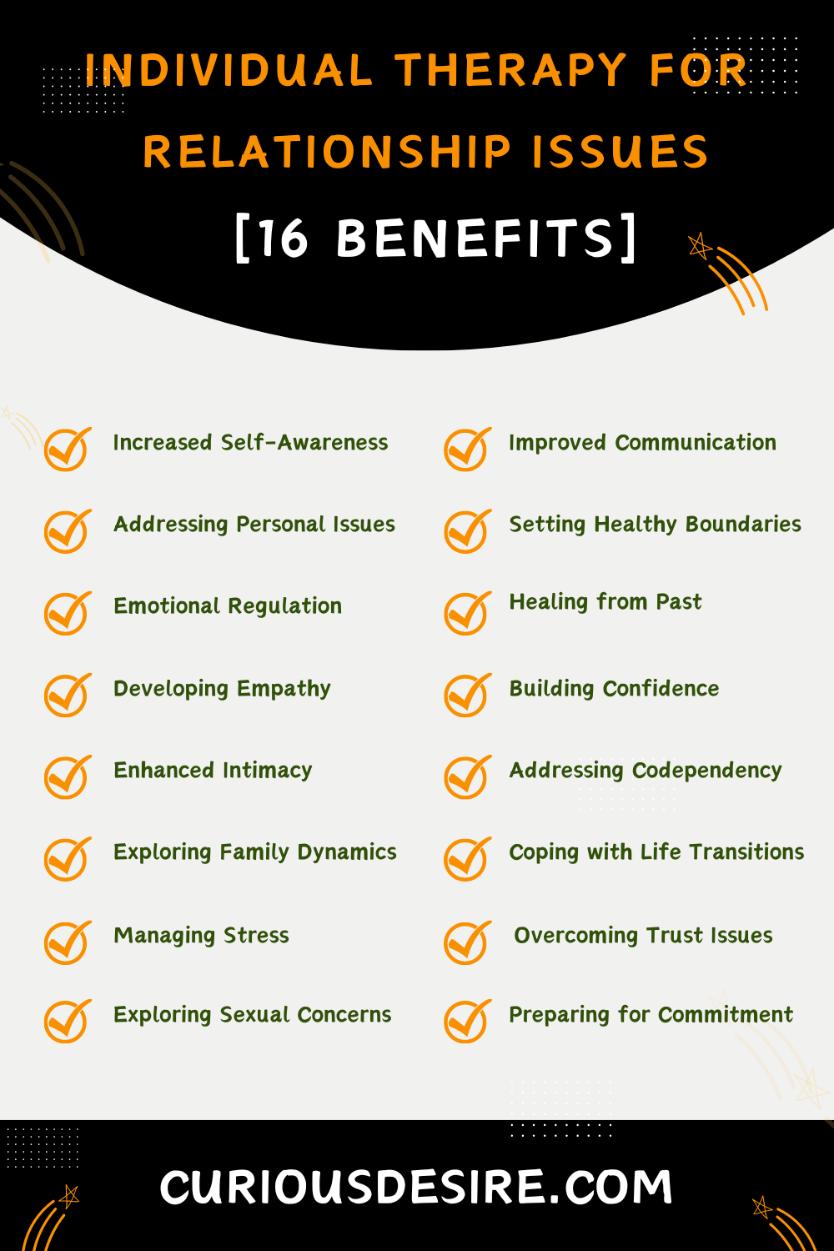Although many acknowledge the benefits of therapy in helping individuals through personal struggles, there’s still some hesitancy, especially when it comes to addressing relationship issues.
Despite the potential for therapy to make a difference, many people continue to grapple with unresolved problems, causing distress not only for themselves but also affecting their partners.
Many people hesitate to pursue therapy, especially alongside their partners, for various reasons ranging from societal stigma and personal fear to feelings of embarrassment or denial. Additionally, some may lack trust in the therapeutic process altogether.
However, individual therapy offers a valuable opportunity for personal growth and relationship improvement.
Let’s take a closer look at how individual therapy can significantly enhance relationship dynamics and personal well-being.
[toc]

1. Increased Self-Awareness
Individual therapy provides a dedicated space for introspection, allowing you to go deep into your thoughts, emotions, and behaviors.
By gaining a clearer understanding of yourself, you become more attuned to how you interact within your relationship.
This heightened self-awareness enables you to recognize recurring patterns and triggers that may be influencing your dynamics with your partner.
For example, you might discover underlying insecurities or communication barriers that contribute to misunderstandings or conflicts.
As you become more aware of these aspects of yourself, you can actively work towards addressing them, leading to more authentic and fulfilling connections with your partner.
2. Improved Communication Skills
Therapy offers a supportive environment to learn and practice effective communication techniques.
Through role-playing exercises and guided discussions, you can develop essential skills such as active listening, expressing emotions constructively, and assertively articulating your needs and boundaries.
As you refine these communication skills in therapy sessions, you gain confidence in expressing yourself openly and honestly with your partner.
Additionally, effective communication helps to reduce misunderstandings and conflicts, paving the way for more harmonious interactions and problem-solving as a couple.
3. Identifying and Addressing Personal Issues
In therapy, you have the opportunity to explore and address personal issues that may be impacting your relationship.
Whether it’s unresolved trauma, self-esteem challenges, or unhealthy coping mechanisms, therapy provides a safe space to process these issues.
By working through these personal challenges, you can mitigate their negative effects on your relationship and build emotional resilience.
4. Setting Healthy Boundaries
Therapy guides you in establishing and maintaining healthy boundaries within your relationship.
By clarifying your values, needs, and limits, you gain clarity on where to draw the line in your interactions with your partner.
Setting healthy boundaries brings mutual respect and understanding between you and your partner, promoting a balanced and equitable relationship dynamic.
As you uphold these boundaries, you create a sense of safety and security within your relationship, laying the foundation for trust and intimacy to flourish.
5. Emotional Regulation
Individual therapy provides support in regulating your emotions effectively, enhancing your emotional intelligence and resilience.
Through mindfulness practices, cognitive-behavioral techniques, and somatic experiencing, you learn to identify and manage intense emotions in healthy ways.
As you develop greater emotional regulation skills, you become less reactive and more responsive in your interactions with your partner.
6. Healing from Past Relationship Wounds
7. Developing Empathy and Understanding
In therapy, you gain insight into your own experiences and perspectives, which enhances your capacity for empathy and understanding towards your partner.
Through guided reflections and therapeutic exercises, you explore your own emotions and reactions, gaining a deeper understanding of your inner world.
This increased self-awareness enables you to empathize with your partner’s feelings and experiences more fully, bringing deeper emotional connection and mutual support.
8. Building Confidence and Self-Esteem
Therapy provides an environment to boost your confidence and self-esteem, empowering you to show up authentically in your relationship.
Through supportive feedback and validation from your therapist, you gain a renewed sense of self-worth and self-assurance.
As you work through insecurities and negative self-beliefs in therapy, you develop a more positive self-image and assertive communication style.
This increased confidence and self-esteem not only benefit your well-being but also enhance the quality of your relationship.
By bringing your authentic self to the table, you inspire trust and admiration in your partner.
9. Enhanced Intimacy
Through therapeutic interventions such as attachment-focused techniques and sensate focus exercises, you can explore and address intimacy issues in a safe and supportive environment.
As you work through relational challenges and emotional blocks in therapy, you create space for vulnerability and closeness to flourish in your relationship.
This deepening of intimacy encourages greater trust, affection, and satisfaction between you and your partner, enriching the quality of your relationship.
10. Addressing Codependency
Therapy helps you recognize and address patterns of codependency or unhealthy reliance on your partner for validation or identity.
Through psychoeducation and self-exploration, you gain insight into codependent behaviors and their underlying motivations.
By developing healthier coping strategies and boundaries in therapy, you can reclaim your sense of autonomy and self-sufficiency.
11. Exploring Family of Origin Dynamics
Therapy provides a space to explore how your upbringing and family dynamics may be influencing your current relationship patterns and dynamics.
By examining your family of origin experiences and relational dynamics, you gain insight into ingrained patterns and beliefs that shape your behavior in relationships.
Through this, you can identify and challenge unhealthy relational patterns inherited from your family of origin.
As you gain clarity on these dynamics, you can make conscious choices to create healthier and more fulfilling relationship dynamics with your partner.
This process of self-discovery and differentiation brings greater authenticity, resilience, and intimacy to your relationship.
12. Coping with Life Transitions
Through therapeutic guidance and coping strategies, you can manage the challenges and uncertainties that accompany life transitions with greater resilience and adaptability.
As you process your thoughts and emotions in therapy, you gain clarity on your values, priorities, and goals, which can positively impact your relationship.
By managing life transitions effectively, you create a stronger foundation for your partnership, promoting mutual support, and growth in times of change.
13. Managing Stress and Anxiety
Therapy equips you with coping strategies to manage stress and anxiety effectively, promoting emotional well-being and relational harmony.
Through relaxation techniques and stress management skills, you can reduce the impact of stressors on your relationship.
As you learn to regulate your stress response in therapy, you become more present and available for your partner.
14. Overcoming Trust Issues
If trust issues are present in your relationship, therapy provides a supportive space to explore the underlying causes and work towards rebuilding trust.
Through honest and open communication in therapy, you can address breaches of trust, misunderstandings, and insecurities safely and constructively.
By rebuilding trust gradually through transparency, accountability, and consistent actions, you can restore intimacy and connection in your relationship.
15. Exploring Sexual Concerns
Individual therapy offers a confidential and non-judgmental space to address sexual concerns or dysfunctions impacting your relationship.
Whether it’s mismatched libidos, performance anxiety, or intimacy issues, therapy provides support in exploring and resolving these challenges.
Through sex therapy techniques and communication exercises, you can enhance sexual communication, intimacy, and satisfaction with your partner.
16. Preparing for Marriage or Commitment
If you’re considering marriage or making a long-term commitment, individual therapy can help you clarify your values, expectations, and goals for the relationship.
Through premarital counseling or commitment-focused therapy, you can explore important topics such as finances, family dynamics, and future aspirations.
By addressing potential challenges and aligning your visions for the future in therapy, you ensure a strong foundation for your partnership.
Individual Therapy For Relationship Issues – FAQs
1. What is the best therapy for relationship problems?
The best therapy for relationship problems depends on the specific issues involved and the preferences of the individuals involved.
Couples therapy, also known as couples counseling or marriage therapy, is a common approach where both partners attend sessions together to address their relationship dynamics and improve communication.
However, individual therapy can also be beneficial, as it allows each partner to work on personal issues that may be affecting the relationship.
2. What type of therapy is used for relationships?
Several types of therapy can be used for relationship issues, including:
- Couples Therapy: Involves both partners attending sessions together to address relationship dynamics and improve communication.
- Family Therapy: Focuses on addressing relationship issues within a family unit, including parent-child relationships and sibling dynamics.
- Individual Therapy: Allows individuals to work on personal issues that may be impacting their relationships, such as unresolved trauma or low self-esteem.
3. Can therapy help with relationship issues?
Yes, therapy can be highly effective in addressing relationship issues.
Whether attending couples therapy together or seeking individual therapy, the process can provide valuable insights, improve communication skills, and help individuals and couples develop healthier relationship dynamics.
4. Can you talk to a therapist about relationship problems?
Yes, you can talk to a therapist about relationship problems.
Therapists are trained to help individuals and couples navigate relationship challenges, whether they involve communication issues, conflicts, trust issues, intimacy concerns, or other relational difficulties.
5. How successful is relationship counseling?
The success of relationship counseling varies depending on factors such as the specific issues being addressed, the commitment of the individuals involved, and the skill of the therapist.
Research suggests that many couples experience significant improvements in their relationships as a result of counseling, with communication skills and conflict resolution being among the most commonly reported areas of improvement.
6. Is there anything you should talk to your therapist about?
You can talk to your therapist about any aspect of your life that you feel is affecting your well-being, including relationship issues.
Therapists provide a confidential and nonjudgmental space for individuals to explore their thoughts, feelings, and experiences, and they can offer support, guidance, and practical strategies for navigating relationship challenges.
7. Who can you talk to about relationship issues?
In addition to therapists or counselors, there are various other sources of support for addressing relationship issues.
This may include trusted friends or family members, religious or spiritual leaders, support groups, or relationship advice hotlines.
Choose someone you feel comfortable talking to and who can offer empathetic and constructive support.
8. Should you tell your therapist about your relationship?
Yes, it can be beneficial to discuss your relationship with your therapist, especially if it’s causing you distress or impacting your well-being.
Your therapist can help you gain insight into the dynamics of your relationship, explore underlying issues, and develop strategies for improving communication and resolving conflicts.
9. Can broken-up couples go to therapy?
Yes, broken-up couples can still benefit from therapy, either individually or together.
Therapy can help individuals process their emotions, gain closure, and learn from the relationship’s challenges to foster personal growth.
Couples therapy may also be beneficial if both partners are open to exploring the possibility of reconciliation or improving their co-parenting relationship.
10. What is relationship counseling?
Relationship counseling, also known as couples therapy or marriage counseling, is a form of therapy that focuses on improving the quality of relationships.
It typically involves both partners attending sessions together, where they work with a trained therapist to address communication issues, conflicts, intimacy concerns, and other relational challenges.
11. How to fix a relationship?
Fixing a relationship often involves open and honest communication, mutual respect, empathy, and a willingness to address underlying issues.
Couples may benefit from seeking therapy to gain insight into their relationship dynamics, learn effective communication skills, and develop strategies for resolving conflicts and rebuilding trust.
12. Where can I get free relationship advice?
There are several resources available for free relationship advice, including online forums, support groups, relationship advice columns in newspapers or magazines, and nonprofit organizations that offer counseling services.
Additionally, some therapists or counselors may offer sliding-scale fees or pro bono services for individuals with financial constraints.
13. What are the 3 stages of Counselling?
The three stages of counseling typically include:
- Building Rapport and Establishing Goals: In this stage, the counselor establishes a trusting relationship with the client, explores their reasons for seeking counseling, and collaboratively sets goals for the counseling process.
- Exploration and Insight: During this stage, the counselor helps the client explore their thoughts, feelings, and experiences more deeply, gain insight into underlying issues, and develop new perspectives and coping strategies.
- Action and Change: In the final stage, the client and counselor work together to implement strategies for change, address specific problems or goals identified earlier in counseling, and evaluate progress toward achieving desired outcomes.

